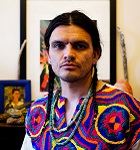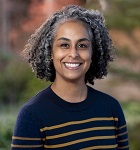New Faculty With Wide Range of Public Health Expertise Join Dornsife This Academic Year
September 12, 2022
This academic year, the Dornsife School of Public Health (DSPH) has welcomed 15 new faculty members who bring a wide range of public health expertise spanning behavioral change, stress, housing, neighborhoods, climate, environmental justice, spatial methods, policy evaluation, and community-based participatory research, among others. A focus on understanding and intervening on systemic racism and inequality as drivers of health permeates their work. The new faculty members are housed throughout various departments, centers, and programs within the School.
The Ubuntu Center on Racism, Global Movements, and Population Health Equity appointed two new faculty members—Ashley B. Gripper, PhD, MPH, and Jaquelyn (Jackie) Jahn, PhD, MPH—who will contribute to the mission of the Center and the School more broadly.
After a search that brought together DSPH and the College of Nursing and Health Professions (CNHP), nine new faculty have been appointed as part of the Drexel FIRST (Faculty Institutional Recruitment for Sustainable Transformation) program cohort. Seven are primary in DSPH and two are primary in CNHP but have a secondary or joint appointment with DSPH.
The FIRST program at Drexel supports early career faculty focused on health disparities research and aims to support the institutional transformations necessary to create and sustain a culture of inclusive excellence.
This new cohort of FIRST faculty includes Stephanie Hernandez, PhD, MS; Josiah Kephart, PhD, MPH, CPH; Jourdyn A. Lawrence, PhD, MSPH; Bertranna Muruthi, PhD; Safiyyah Okoye, PhD, MSN; and Kasim Ortiz, PhD(c), MS; Agus Surachman, PhD, MS; Luis Arturo Valdez, PhD, MPH; and Kofoworola D.A Williams, PhD, MPH.
Dornsife Departments are also welcoming additional new faculty including Department Chair of Health Management and Policy Jan M. Eberth, PhD, and Assistant Professors Aritra Halder, PhD, MS; Elizabeth (Libby) Salerno Valdez, PhD, MPH; and Alina Schnake-Mahl, ScD, MPH.
“We are absolutely thrilled to be welcoming such an outstanding group of 15 new faculty to our school this year. Their energy, creativity, interdisciplinarity, and experiences will continue to strengthen our School’s commitment to the most rigorous science in the service of meaningful action and social justice,” said Ana Diez Roux, MD, PhD, Dana and David Dornsife dean and distinguished university professor of epidemiology at DSPH.
Learn more about each new faculty member below:
Community Health and Prevention

Ashley B. Gripper, PhD, MPH (she/her)
Assistant Professor
The Ubuntu Center on Racism, Global Movements, and Population Health Equity. Secondary appointment in EOH
Gripper brings a wealth of knowledge and experience as a scholar, community organizer, and activist. Her transdisciplinary research uses mixed methods to investigate the associations between urban agriculture, mental health, spirituality, and collective agency in Black communities.
Gripper demonstrates her commitment to racial equity, justice, and liberation by being deeply embedded in social movements and has been part of the urban agriculture movement in Philadelphia since 2012 when she started as a food educator. She currently serves as a project team member, data analyst, and a community engagement specialist for the Philadelphia Urban Agriculture Comprehensive Plan and on the policy subcommittee for Soil Generation, a Black & Brown agroecology coalition of women and non-binary farmers and organizers working to ensure people of color regain community control of land and food, share resources and prioritize community healing, grow food, and protect and commune with the land. She also serves on the policy working group for the National Black Food and Justice Alliance and the Philadelphia Food Policy Advisory Council for the Mayor’s Office. She completed her PhD in the Department of Environmental Health at the Harvard T.H. Chan School of Public Health where she was a Robert Wood Johnson Health Policy Scholar.
Read Gripper's full faculty bio

Bertranna Muruthi, PhD (she/her)
Assistant Professor of Counseling & Family Therapy (CNHP)
Drexel FIRST Program. Secondary appointment in CHP
As a family scientist, Muruthi’s primary aim is to conduct research that will lead to culturally responsive community-based interventions and prevention programs for immigrant families in the United States. An important aspect of her work focuses on transitional issues that immigrant families must negotiate as well as predicting factors associated with their risk and resilience behaviors. Specifically, she uses an intersectionality lens within a transnational framework to explore how immigrant experiences evolve and change as immigrants stay connected to their native countries while in their host countries. Intersectionality considers the social identities and statuses that may differ between countries and are often considered as existing independently, yet in practice immigrants experience these statuses simultaneously. Transnationality refers to immigrant families who live across borders and spend some or all of the time separated from each other yet maintain a collective welfare. These perspectives provide her with vital tools to highlight the lives of marginalized families while empowering their cultural practices. They allow for a closer examination of connections that immigrants have to their native countries and how these connections may affect immigrants’ resettlement experiences in host nations.
Muruthi’s current research looks at the family as the unit of analysis within the context of communities and the community-based organizations that serve them. As such, family needs and resilient behaviors are understood at a systemic level. There are three areas she addresses to develop her program of research: (a) migration, resettlement, and transnationalism of documented and undocumented immigrants; (b) predictors of risk and resilient behavior in immigrant families; and (c) development of intervention and prevention programming for immigrant families. Her research uses culturally responsive community-based collaborative methods. She uses this strength-based model to look at individuals and families within the context of communities and the community-based organizations that serve them. She incorporates community culture and knowledge and practices throughout research with the aim of producing culturally effective actions that lead to community transformation and social change.
Read Muruthi's full faculty bio

Elizabeth (Libby) Salerno Valdez, PhD, MPH (she/her)
Assistant Professor
Valdez is a community-engaged scholar focusing on using participatory methods to investigate and address health inequities. Her research program fosters ethical and mutually beneficial academic-community partnerships using participatory, social justice-oriented approaches to examine the structural and environmental characteristics of particular “risk environments” that influence adolescent health among historically marginalized communities, including Latinx/o/a, Black or African American, and LGBTQ+ youth. Prior to joining Dornsife, she was a Postdoctoral Pathway Fellow at the University of Massachusetts Amherst and served as a core faculty member within the Center for Community Health Equity Research.
Valdez also worked as an assistant research social scientist with the Southwest Institute for Research on Women at the University of Arizona on research related to adolescent substance use and reproductive health. She received her PhD in Health Behavior Health Promotion with a minor in Maternal and Child Health from the University of Arizona.
Read Valdez's full faculty bio

Luis Arturo Valdez, PhD, MPH (he/el/they/them)
Assistant Professor
Drexel FIRST Program
Valdez is a first-generation Mexican immigrant of Yaqui and Opata lineage raised and trained in the US-Mexico borderlands. They earned their PhD in Health Behavior & Health Promotion with a minor in Epidemiology at the University of Arizona in 2017. Luis’s dissertation focused on the intersected influences of sociocultural norms and social contexts on alcohol and substance abuse and treatment-seeking in Mexican-origin Latino men. Immediately after receiving his PhD, he started a one-year postdoctoral fellowship with the Center for Border Health Disparities Research at the University of Arizona Health Sciences. Their postdoctoral work explored the improvement of community-academic partnerships with communities along the U.S.-Mexico border, and the evaluation of community engagement and health risk communication strategies focused on chronic disease prevention with Latinx communities at the U.S.- Mexico border.
Valdez uses community-led mixed-methods approaches to understand and address the impact of systemic processes (i.e., racism & patriarchy) that perpetuate health inequities in historically marginalized populations. The large majority of the work that they facilitate is community-centered and works from a foundational aim to build mutually-beneficial and ethical research collaborations with communities. Currently, Valdez is interested in understanding how individual-level characteristics interact with macro-level factors to influence the health-related behaviors of Latino men. Broadly, his research examines a range of behaviors related to alcohol and substance misuse, chronic stress, healthy food choice, and physical activity, with an emphasis on developing and testing scalable, multilevel, culturally-, regionally-, and gender-responsive interventions that intentionally consider the heterogeneity that exists in distinct Latinx communities in the U.S. An emerging area of his work also incorporates the improvement of health communication and community engagement strategies in research and public health practice with historically underserved communities.
Read Valdez's full faculty bio

Kofoworola D.A Williams, PhD, MPH (she/her)
Assistant Professor
Drexel FIRST Program
Williams is a social and behavioral scientist and digital mental health researcher. She joins us from Northwestern University's Center for Behavioral Intervention Technologies where she was a T32 postdoctoral fellow. Her early work leveraged mixed methods grounded in health behavior theory to examine and understand social-ecological and behavioral determinants of anxiety and depressive symptom risk and formal and informal mental health-related help-seeking among emerging adult, Black men. Her early work also included various independent and collaborative research efforts focused on exploring how visual and text-based user generated content and hashtags are being used on social media by Black men and individuals from diverse communities. This social media work began to highlight unique ways social media platforms can be leveraged within the space of mental health prevention and promotion.
Williams’s more recent work employed multi-methods grounded in human-centered design principles to identify current mental health needs and risk among college-attending, Black men and investigate their preferences and acceptability for using social media and mobile technologies for mental health symptom management, stress, self-care, and help-seeking. Her future work will center on reducing mental health disparities and advancing digital mental health equity for Black men and traditionally excluded populations.
Read Williams's full faculty bio
Environmental and Occupational Health

Josiah Kephart, PhD, MPH, CPH (he/him)
Assistant Professor
Drexel FIRST Program
Urban Health Collaborative
Kephart is an environmental epidemiologist who seeks to understand and mitigate the environmental determinants of health disparities. After working in community health in Philadelphia and Honduras, he received an MPH and PhD in exposure science and environmental epidemiology from the Johns Hopkins Bloomberg School of Public Health. His early research focused on designing and implementing randomized controlled trials of interventions to reduce household air pollution and improve cardiopulmonary health among women in indigenous Aymara communities in Peru. With the support of a Fogarty Global Health Fellowship, his research has provided novel evidence of hazardous emissions from gas stoves, which are widely promoted and distributed to low-resource households in the Global South as a “clean” alternative fuel.
Kephart's recent research focuses on understanding the contribution of climate change, air pollution, and the urban environment to health disparities in Latin America and the U.S. By leveraging the tools of environmental and social epidemiology, his research aims to understand the impacts of large-scale environmental exposures, including extreme heat, air pollution, and climate-related disasters, on health and health inequities at the population level.
Read Kephart's full faculty bio
Epidemiology and Biostatistics

Aritra Halder, PhD, MS (he/him)
Assistant Professor
Halder is an assistant professor of Biostatistics in the Department of Epidemiology and Biostatistics. He completed his PhD in Statistics from the University of Connecticut in July 2020.
His research interests are Bayesian modeling, Spatial and Spatiotemporal analysis, and Optimization.
His areas of applications include public health and policy, hydrology, climatology, computer vision and transcriptomics.
Read Halder's full faculty bio

Stephanie Hernandez, PhD, MS (she/her)
Assistant Professor
Drexel FIRST Program
Hernandez’s research agenda centers on the experiences of minoritized populations to detect and understand health disparities and barriers to health care in the U.S. Her doctoral research assessed the relationship between multiple or intersecting minoritized racial, ethnic, and sexual identities and physical and mental health outcomes, utilizing data from a large nationally representative health survey. While her dissertation focused on identifying and documenting patterns of health disparities, her current research shifts the discussion towards identifying mechanisms that help explain why disparities exist. As a postdoctoral researcher fellow, Hernandez examined perceived stress among lesbian, gay, and bisexual (LGB) Black and Hispanic adults, socioeconomic status differences across sexual orientation and gender expression, and allostatic load among androgynous and gender nonconforming adults.
Hernandez is thrilled to continue her work on sexual and gender minority health disparities at Drexel University. Her future research agenda is organized into three broad areas: documenting and understanding health disparities, operationalizing intersectionality in health disparities research, and incorporating biosocial approaches to understanding health disparities. In the first area, she will be using data from the Add Health SOGI-SES study to understand the relationship between sexual orientation, gender identity, socioeconomic status, and health. In the second area focused on intersectionality, Hernandez will assess how systems of power, privilege, and oppression manifest within the health care system, and influence the health of adults with minoritized identities. In the third area, she will incorporate biosocial approaches to identify, understand, and produce new knowledge on the social and biological pathways that are important to population health and the understanding of health disparities across the life course.
Read Hernandez's full faculty bio

Jaquelyn (Jackie) Jahn, PhD, MPH (she/her)
Assistant Professor
The Ubuntu Center on Racism, Global Movements, and Population Health Equity
Jahn is a social epidemiologist whose research investigates how structural racism in social policies shapes population health and racial health equity. Much of her work focuses on the health of individuals, families, and communities that are affected by the U.S. criminal legal system, as well as social policy solutions to address racial health inequities. Since 2017, she has worked alongside Deeper Than Water, a coalition of organizations led by incarcerated and formerly incarcerated organizers dedicated to exposing the rampant human rights abuses that prisoners in the United States are subjected to, using the lens of water justice as an entry point.
In addition, Jahn was a co-author of the American Public Health Association policy statement Advancing Public Health Interventions to Address the Harms of the Carceral System. Prior to joining the Ubuntu Center as a postdoctoral fellow, she was a postdoctoral scholar at the City University of New York. She received her Ph.D. in Population Health Sciences from the Harvard T.H. Chan School of Public Health, where she also received her MPH.
Read Jahn's full faculty bio

Jourdyn A. Lawrence, PhD, MSPH (she/her)
Assistant Professor
Drexel FIRST Program
Lawrence is a social epidemiologist whose research goals include addressing racism as a cause of racial health inequities and identifying interventions to mitigate these impacts. During her doctoral training, she collaborated on highly impactful narrative and systematic reviews that summarized the pathways and associations between racism, social oppression, and health while also providing suggestions for steps to evaluate and mitigate racial health inequities. Her doctoral research examined how experiences of discrimination become embodied – or “get under the skin” – to affect the health of marginalized racial groups using instrumental variable estimation, meta-analysis, and multiple discrimination measures.
Upon receiving her PhD in Population Health Sciences at Harvard University, Lawrence began her role as a Health and Human Rights fellow at the FXB Center for Health and Human Rights at Harvard. There, she examined the implications of interpersonal and structural racism on aging and cognitive-related outcomes. She also examined how monetary reparations would alter premature and overall mortality outcomes as part of the FXB Center’s Making the Public Health Case for Reparations project, which is supported by a grant from the Robert Wood Johnson Foundation. With actionable research centered, the analysis examined how reparations – both necessary and due – may also act as a structural intervention to mitigate the impacts of racism on the health of Black adults in the U.S.
Read Lawrence's full faculty bio

Agus Surachman, PhD, MS (he/him)
Assistant Professor
Drexel FIRST Program. Secondary Appointment in Nursing (CNHP)
Surachman is a developmental and health disparities scholar trained at Penn State’s Department of Human Development and Family Studies. He was a predoctoral fellow in the T32 Pathways training program, focusing on identifying psychosocial determinants and biological pathways that underlie healthy and unhealthy aging. He completed postdoctoral training at the UCSF's Aging, Metabolism, and Emotion (AME) Center to further his research on the biopsychosocial aspect of aging. His research program examines how social factors create disparities in health through complex biopsychosocial mechanisms.
Surachman is mainly interested in understanding the intersectionality between life course socioeconomic status (SES) and race as critical social factors that differentiate access to gain and accumulate resources that promote health and avoid diseases. In addition, his research examines the impact of social stratifications on psychological factors implicated in health disparities through the lens of the daily stress process or minor day-to-day challenges. One major pathway that links the daily stress process to disease is accelerated aging, an important biological marker for multiple chronic diseases for which there are known SES and racial disparities. He examines accelerated aging through multiple physiological pathways, including gene expression and epigenetic modification, inflammation, metabolic syndrome, and accelerated renal aging.
Read Surachman's full faculty bio
Health Management and Policy

Jan M. Eberth, PhD (she/her)
Professor and Chair
Eberth joined Dornsife from the Department of Epidemiology and Biostatistics at the University of South Carolina where she was Associate Professor and the Director of the Rural and Minority Health Research Center. Her research focuses on identifying social and structural barriers to accessing high-quality healthcare in the U.S., particularly among marginalized populations. Most of her work focuses on disparities in early detection and treatment for commonly diagnosed cancers including lung and colorectal cancer. She is a Fellow and current President of the American College of Epidemiology, Vice-Chair of the National Lung Cancer Roundtable Provider Engagement and Outreach Task Group, and member of the Cancer Prevention and Control Research Network’s Rural Cancer Workgroup.
In addition, Eberth has a long history of policy and community engagement, providing scientific advisement and advocacy for the National Rural Health Association, American Cancer Society Cancer Action Network, and GO2 Foundation for Lung Cancer.
Read Eberth's full faculty bio

Safiyyah Okoye, PhD, MSN (she/her)
Assistant Professor of Nursing (CNHP, 75%) & Health Management & Policy (DSPH, 25%)
Drexel FIRST Program
Okoye’s goal as a public health researcher and nurse practitioner is to increase equity in health and function for older adults. After working as a primary care nurse practitioner, she pursued a doctoral degree at the Johns Hopkins School of Nursing. In her dissertation she investigated associations between sleep health and physical function in low-income, mostly Black older adults with disabilities. She found that objective measures of poor sleep were associated with lower objectively measured physical performance and greater instrumental activity of daily living disability. Another paper from her dissertation examined associations between housing conditions and sleep health in this population and found that exterior housing disrepair was associated with poorer sleep health. Her postdoctoral fellowship at the Johns Hopkins School of Public Health in the Epidemiology and Biostatistics of Aging Training Program provided training in conducting epidemiological research on older adult health using large, population-based datasets.
Currently, Okoye is wrapping up a second fellowship back at the Johns Hopkins School of Nursing supported by the Training Program in Health Services and Outcomes Research for Aging Populations. Her current studies are about the relevance of housing conditions and other environmental characteristics to the delivery and receipt of long-term services and supports.
Read Okoye's full faculty bio

Kasim Ortiz, PhD(c), MS (he/him)
Assistant Professor
Drexel FIRST Program. Secondary appointment in CHP
Ortiz is a doctoral candidate in Sociology at the University of New Mexico, where he was a National Institute of Aging (NIA) Dissertation Fellow. He specializes in sexual and gender minority health disparities, with a focus on the role of racial stratification in shaping substance use behaviors and deploys primarily quantitative research methods.
Ortiz has authored 30 peer-reviewed journal articles. His NIA-supported (R36) dissertation, “The Gayborhood Was Never Here For Some of Us! Health Consequences of Racialized Exclusion among Sexual Minorities across the Lifecourse” uses rigorous quantitative analytic strategies to understand how racial stratification, manifested in gayborhoods across the life course, shapes racial/ethnic variations in cigarette smoking among sexual minorities. His active and prospective research program employs critical race theory, intersectionality, racial capitalism, and life course frameworks (i.e., Health Equity Promotion Model) grounding unique examinations of how structural racism shapes the health of vulnerable populations.
Read Ortiz's full faculty bio

Alina Schnake-Mahl, ScD, PhD (she/her)
Assistant Professor
Urban Health Collaborative
Schnake-Mahl is a social epidemiologist and health services researcher, and her primary research interest is in the social and political determinants of health inequities. Her current work aims to identify the compositional and contextual features of places — including neighborhood factors, social policies, and governance structures — that are associated with health disparities. Her policy work focuses on occupational- and housing-related social policies. She uses a combination of descriptive and causal methods to identify and inform policies and interventions that can mitigate health inequity. She received an NIH K01 career development award to examine neighborhood and policy determinants of disparities in influenza and COVID-19 acute care utilization.
Schnake-Mahl earned a ScD and MPH in social epidemiology from the Harvard T.H. Chan School of Public Health. Before joining the faculty, she was a postdoctoral fellow at the Drexel Urban Health Collaborative and previously worked in applied population health research and evaluation.
Read Schnake-Mahl's full faculty bio
Learn more about the work of the Drexel FIRST (Faculty Institutional Recruitment for Sustainable Transformation) program and The Ubuntu Center on Racism, Global Movements, and Population Health Equity.